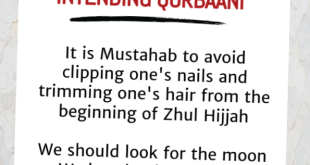 1. To read two rakaat waajib salaah of Eid with six extra takbeers without any azaan or iqaamat. [1]
1. To read two rakaat waajib salaah of Eid with six extra takbeers without any azaan or iqaamat. [1]
عن ابن عباس رضي الله عنه أن النبي صلى الله عليه و سلم صلى يوم العيد بغير أذان ولا إقامة (ابن ماجة رقم 1274)
Hadhrat ibn Abbaas (Radhiallahu Anhuma) reports that Rasulullah (Sallallahu Alaihi Wasallam) would perform the (Eid) salaah on the day of Eid without any azaan or iqaamat.
2. To recite Surah A’ala in the first rakaat, and Surah Ghaashiya in the second rakaat of the Eid salaah.
عن النعمان بن بشير رضي الله عنه قال كان رسول الله صلى الله عليه وسلم يقرأ في العيدين وفي الجمعة بسبح اسم ربك الأعلى، وهل أتاك حديث الغاشية. (مسلم رقم 878)
Hadhrat Nu’maan ibn Basheer (Radhiallahu Anhu) relates that Rasulullah (Sallallahu Alaihi Wasallam) would recite Surah A’ala and Surah Ghaashiya in both the Eid salaah as well as the Jumuah salaah
3. One should remain seated after the Eid salaah and listen to the khutbah. Remaining for the khutbah is an emphasised sunnah. [2]
4. During the khutbah it is waajib for one to remain silent and listen attentively to the khutbah. [3]
5. It is forbidden to perform any nafl salaah in the Eidgah either before or after the Eid salaah. [4]
عن ابن عباس رضي الله عنهما أن رسول الله صلى الله عليه و سلم خرج فصلى بهم العيد لم يصل قبلها ولا بعدها (ابن ماجة رقم 1291)
Hadhrat ibn Abbaas (Radhiallahu Anhuma) reports that Rasulullah (Sallallahu Alaihi Wasallam) would come to the Eidgah and perform the Eid salaah. He would not perform any nafl salaah before the Eid salaah nor after the Eid salaah (i.e. at the Eidgah).
6. By staying awake and making ibaadat on the night of Eid, one will be rewarded in this manner that when all the hearts die, his heart will remain alive.
عن أبي أمامة رضي الله عنه عن النبي صلى الله عليه و سلم قال من قام ليلتي العيدين محتسبا لله لم يمت قلبه يوم تموت القلوب (ابن ماجة رقم 1782)
Hadhrat Abu Umaamah (Radhiallahu Anhu) reports that Rasulullah (Sallallahu Alaihi Wasallam) said: “The one who stands up in salaah on the two nights of Eid with the hope of receiving reward from Allah Ta’ala, his heart will remain alive on the day when all the hearts will die.”
[1] (ويصلي الإمام بهم ركعتين مثنيا قبل الزوائد وهي ثلاث تكبيرات في كل ركعة) (الدر المختار 2/172)
[2] (ويخطب بعدها خطبتين ) وهما سنة (الدر المختار 2/175)
[3] ( وكل ما حرم في الصلاة حرم فيها ) أي في الخطبة خلاصة وغيرها فيحرم أكل وشرب وكلام ولو تسبيحا أو رد سلام أو أمر بمعروف بل يجب عليه أن يستمع ويسكت ( بلا فرق بين قريب وبعيد ) في الأصح محيط ولا يرد تحذير من خيف هلاكه لأنه يجب لحق آدمي وهو محتاج إليه والإنصات لحق الله تعالى ومبناه على المسامحة وكان أبو يوسف ينظر في كتابه ويصححه والأصح أنه لا بأس بأن يشير برأسه أو يده عند رؤية منكر والصواب أنه يصلي على النبي صلى الله عليه وسلم عند سماع اسمه في نفسه ولا يجب تشميت ولا رد سلام به يفتى وكذا يجب الاستماع لسائر الخطب كخطبة نكاح وخطبة عيد وختم على المعتمد (الدر المختار 2/159)
[4] ولا يتنفل قبلها مطلقا… ( وكذا ) لا يتنفل ( بعدها في مصلاها) (الدر المختار 2/170)
 Wifāq ul Ulāma (SA) ASSOCIATION OF SOUTH AFRICAN 'ULAMA
Wifāq ul Ulāma (SA) ASSOCIATION OF SOUTH AFRICAN 'ULAMA
